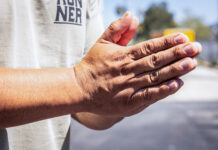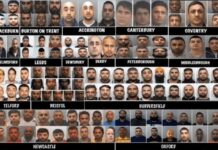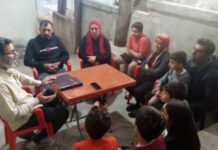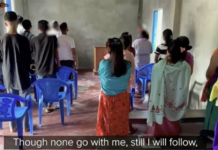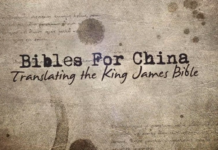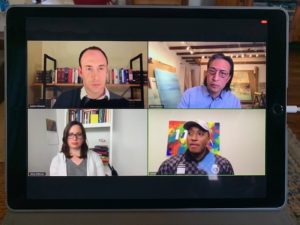
ALBUQUERQUE, NEW MEXICO (ANS)—With all the craziness and ache the Covid-19 crises has caused around the world, there seems to be little room for creativity. But not according to Lecrae, Alissa Wilkinson, and Mako Fujimura. During a Virtual Veritas Forum, hosted by moderator, Andrew Schuman, we are told that “lament is the seed of creativity.”
Virtual Veritas
As a university-directed outreach, The Veritas Forum has a robust history of engaging the head and heart. According to the Veritas website, “The Veritas Forum helps students and faculty ask life’s hardest questions,” helping “to answer the big ‘why’” questions.”
On Wednesday night, April 8th, viewers of the hour-plus discussion got a glimpse of this “why” in a segment entitled Coronavirus & Quarantine: The Lament, Hope, & Creativity Edition.
My wife and I sat on our couch and soaked it in.
Glimpse of New Life
![]()
Schuman opens his questions by asking the guests what is keeping them busy during the quarantine, giving the viewers a “glimpse of their lives.”
Wilkinson, a film critic, author, and professor, states she is turning her attention away from blockbuster films (theaters are closed, after all) to online indie and art films. She continues her teaching via online forums.
Lecrae, an award-winning musician and activist, asks a rhetorical question: “What hasn’t changed?” And jokingly states, “The biggest and most traumatic aspect of my life is running out of toilet paper.” Then, “Everything has changed. There’s new patterns of life,” he responds.
Mako Fujimura, an artist, author, and former “Daniel of the Year” for World Magazine, notes that he’s started a You Tube channel and continues to paint. In the end, as an artist, he is trying to use “generative ways to make sense of the trauma.”
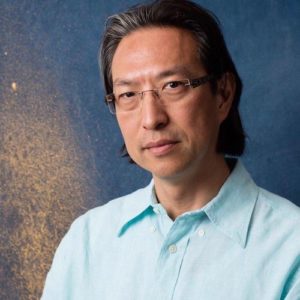
Lament and Creativity
Schuman’s second question revolved around how creative people find a connection between lament and creativity.
Fujimura responds by saying that he was at ground zero during 9-11 so is accustomed to trauma. After 9-11, Fujimura spent months trying to make sense of it all, figuring out what the future holds.
Concerning the COVID crises—which is universal in impact—he attempts to ask questions and probe, yearning to discover how trauma affects him (something he is still dealing with). He notes that “the most indelible marks made in cultural history has been done in trauma.” And that “it’s a time for artist to harness their creative energies… and focus on our inner voices.”
For Lacrae, he writes from trauma and pain to “show others they are not alone.” He continues, “Art that is created by wounded people helps other wounded people know that they are not experiencing this alone.” As a musician he writes from the “perspective of reality” and “woundedness.” Lecrae sees that “scars help us know our wounds can heal.” He reminds the listeners of the forum, trauma is real, but so is healing.
Wilkinson states, “Art-making is a language they are speaking, how artists process and understand the world and then they invite us into that experience… Art can help us translate our experience that we can’t put words around.” As a writer she can write about it, but other artists help make sense of the experience. She notes the Bible models this via the Psalms and prophecy.
Grief versus Despair

The next question Schuman asks the panel is how artists see the difference between grief and despair.
Lecrae defined grief as “acknowledging loss or pain, something that has deeply affected me,” whereas despair is perplexing “without hope or a solution.” In his darkness moments, Lecrae never wants to “grieve to the point of despair…I do have hope. Ultimately, I believe in the words of Jesus… the eternal hope He does offer.” As an artist, he wants his “ceiling to become someone else’s floor. I am able to articulate and express the pain and grief I’m going through so someone else can start there and have that as a foundation and walk upon it.”
Fujimura sees Christ as the example of how to deal with suffering, noting C.S. Lewis’ book A Grief Observed as a fine summary between the grief and despair. He notes, “lament is a disciplined practice… it a universal condition. Whereas grief “comes to you,” it is personal. A broader issue he responds to is how artists respond to grief. For Fujimura art can be a healing force. He states, “Art can heal; it can mend.” Concluding his thoughts with this: artists “try not to fix it [the problem], but to make something new.”
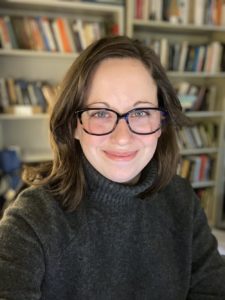
Moving and Meaningful
After the first few questions, Andrew Schuman continues probing the artists with questions such as creativity and meaningfulness, how to faithfully foster creativity, and practical advice for artists. The panels answers were very moving.
Highlights include Wilkinson’s reminder that what artists create “is made to be shared, collaborative projects between the artist and community.” And later, Wilkinson asks, “How can artist be a part of the solution” to the grief and pain? Lecrae reminds us that creativity is a discipline, and out of the quantity will come quality. For Fujimura, he likens his work in a similar way to Jesus’ tears, “painting with the tears of Christ.”
When it comes to practical advice, Lecrae suggests a three-part process: one must “digest” the reality that is before you; two, “access where the needs are;” and, three, “invest,” finding ways to help your family, community, and others.
For Fujimura, he invokes Jeremiah 29, seeing a confluence between the financial, social, and creative factors. Fujimura encourages people to be creative and social first, they will “amplify” the financial factors.
More Food For Thought
Much more can be said about the discussion panel. Fortunately, The Veritas Forum will release the entire conversation this weekend. Also, The Veritas Forum has a full listing of exchanges on its website, helping give more food for thought concerning the crises we are in.
As a conclusion, ask yourself some of the questions the panelist in the Coronavirus & Quarantine: The Lament, Hope, & Creativity Edition posed:
- What am I really about during this crisis?
- What does the trauma tell me about myself?
- Where am I investing my time and talent during the trial?
- And how can I re-calibrate, to make an impact in times of trauma?

